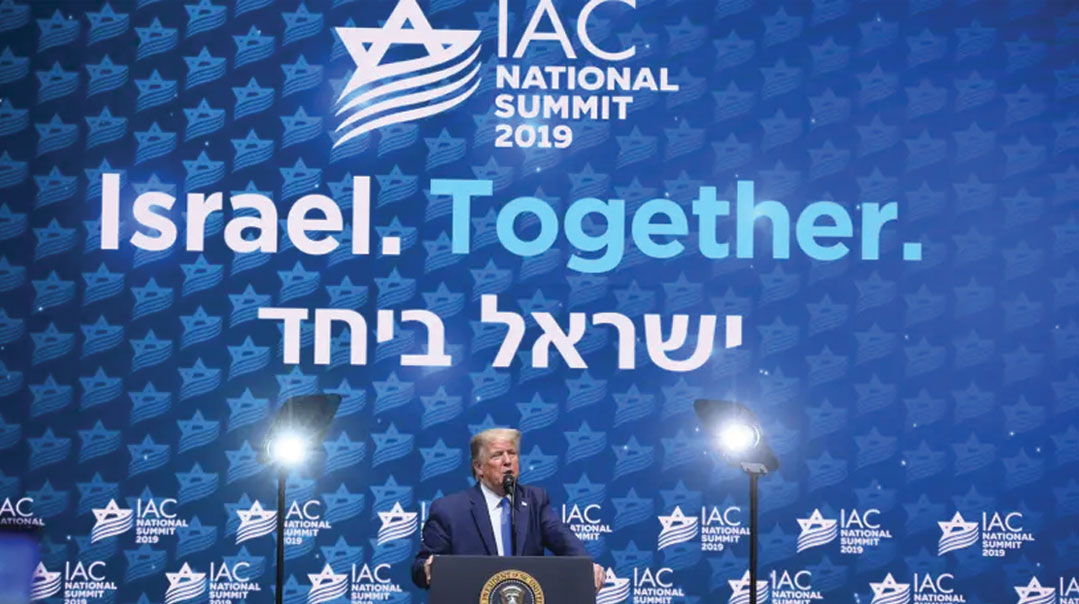Kumbaya in South Florida

The excitement in the hall was palpable, and it was clear that the majority of those present were enthusiastic Trump admirers

US President Donald Trump speaks at the Israeli-American Council 2019 Summit. (Photo credit: ISRAEL-AMERICAN COUNCIL)
Over 4,000 people attended last week’s conference of the Israeli-American Council (IAC) in Florida, a record number for an organization whose power and influence are only growing. Over three days, dozens of panels were held on subjects ranging from American-Israeli relations to Israel’s internal affairs and anti-Semitism.
The directors of some of Israel’s largest organizations, along with former IDF commanders and Trump administration officials (Elan Carr, Jared Kushner, and Ambassador Ron Dermer), attended the event, as did heavyweight Jewish donors Sheldon and Miriam Adelson, who founded the organization.
If five to ten years ago the IAC was a small group representing Israeli-Americans, this year’s gathering showed that it has become a significant player in American Jewish life. Few organizations are granted a speech from the president of the United States, but the IAC is now in that select club. On Motzaei Shabbos, President Trump made a special trip to Florida to address the conference and participants packed the hotel and conference room to welcome him.
The excitement in the hall was palpable, and it was clear that the majority of those present were enthusiastic Trump admirers. Many came with hats or T-shirts bearing the president’s name and organizations like JEXIT (Jews Exit the Democratic Party) were visible.
When the president ascended the platform, the entire audience rose to its feet, greeting him with chants of “Trump,” and “four more years.” Some climbed on their chairs to get a better view.
It was no ordinary speech. Trump attempted, not always successfully, to walk between the raindrops — vociferously criticizing the Democratic Party while attempting to remain neutral on Israel’s complicated political situation. While he largely succeeded, he did accuse the Democratic Party of hating Israel, a statement that didn’t sit well with the organizers, who strove to maintain a nonpartisan atmosphere.
Trump closed his speech with what many saw as a moving gesture, inviting the Shalva band (made up of people with disabilities) onstage to perform “God Bless America.”
Yitzchak Ravitz, head of the local council of Telshe Stone, told Mishpacha that he was glad to be present at Trump’s speech.
“It’s easy to understand why Jews love him so much,” he said. “He spoke from the heart about his identification with the Jewish People and the importance of defending the Jewish People. Words uttered from the heart touch the heart, no matter what language they’re spoken in.”
Ravitz added that while the president’s speech was special, the highlight of the event was the communal singing on Motzaei Shabbos.
“The whole audience rose to its feet, religious and secular alike, and sang ‘Hashem melech, Hashem malach, Hashem yimloch, l’olam va’ed,’ ” he said. “It shows that this convention brings the Jewish People together. No matter where the Jewish People finds itself, we’re still united around the same things.”
Several dozen chareidim attended the conference (which served kosher food), and a number of chareidi men and women took part in the panels. Shoham Nicolet, IAC’s CEO, told Mishpacha he’s proud that his convention included Orthodox participants and wants to encourage even more participation.
“We understand that without Jewishness, Israeli-ness will not survive here [in the US],” he told me. “In Israel, you wake up in the morning, you don’t need to do anything [in order to live Jewish life] because the Jewish identity is very strong there. Here in the US, if you don’t wake up in the morning and make sure to invest in a Jewish [way of life], especially with kids, it won’t survive.”
Rabbi Levi Shemtov, the executive vice president of American Friends of Lubavitch (Chabad) in Washington, D.C., told Mishpacha the organization has made the convention Orthodox-friendly.
“The leadership [of IAC] did a good job making many adjustments for Shabbos and kashrus,” he said. “President Trump’s speech started only on Motzaei Shabbos, and even if everyone here is not yet shomer Shabbos, the crowd collectively respected Shabbos. That’s saying a lot about the people behind the organization.” Indeed, Rabbi Shemtov believes that IAC could be a model for other organizations looking to bring together religious and secular Jews.
And what is Rabbi Shemtov, a non-Israeli, doing at the conference? “It all started with the request to make Kiddush and explain it years ago,” he said. “And as a result of that, I required that they keep Shabbos at the event, which they did.”
Yitzhak Herzog, head of the Jewish Agency, told Mishpacha he is worried about the rise of anti-Semitic attacks in Brooklyn against chareidi Jews. “We are witnessing a huge rise in anti-Semitism worldwide and we’re also witnessing it in America,” he said.
“We live in an era of hate and fear in public discourse — you have white supremacists and fascists on the right and haters and bashers of Israel and the Jewish state on the left. And together with hate speech in social media and classical anti-Semitism directed against Jews, we are in one of the worst periods of anti-Semitism since World War II. The Jewish Agency believes its import to include the chareidi community in its activities, not only regarding anti-Semitism, but when it comes to the other Jewish related matters [as well].”
(Originally featured in Mishpacha, Issue 789)
Oops! We could not locate your form.













